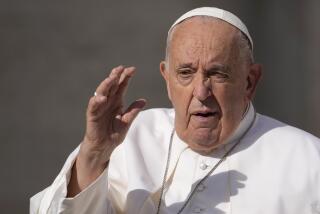Catholic Church reform process disappoints hopes of more equity for women

A years-long process to reform the Catholic Church closed Saturday with recommendations that fell short of hopes that women would be given more equity.
The pope said he would not issue a teaching document from the recommendations, which called for women to be allowed all opportunities that Church law already provides while leaving open the contentious question of allowing women to be ordained as deacons.
As a result, it remains unclear what if any authority or impact the synod’s final recommendations will have, given the purpose of the exercise was to provide the pope with specific proposals on reform.
Francis said he would continue to listen to the bishops’ counsel, adding “this is not a classic way of endlessly delaying decisions.”
The Vatican’s top doctrinal officer, Cardinal Victor Manuel Fernandez, told an assembly of bishops and laypeople earlier that the pontiff said the moment for allowing ordination of women as deacons in the church “is not ripe.”
The ynod process had sparked great hopes for change, especially for women, who have long complained that they are treated as second-class citizens in the church. Women are barred from the priesthood and the highest ministerial positions in the Catholic Church, yet do the lion’s share of the work running Catholic hospitals and schools and passing the faith onto future generations.
Deacons perform many of the same functions as priests, such as presiding over baptisms, weddings and funerals, but they cannot celebrate Mass. Advocates say allowing women to be deacons would help offset the shortage of priests. Opponents say it would signal the start of a slippery slope toward ordaining women to the all-male priesthood that Francis has repeatedly reaffirmed.
Speaking to the synod on Thursday, Fernandez explained that a special working group would continue beyond the closing of the meeting, but that its focus would be on discussing the role of women in the church — not in the diaconate.
He added that while working with women in previous pastoral roles, “most did not ask for or want the diaconate, which would be cumbersome for their lay work.”
He did not respond directly to a request to define what would determine “ripeness” for a greater role for women.
The outcome is a disappointment for Catholics who have been campaigning for recognition that women share a spiritual calling that is no different from a man’s. They also noted that despite the inclusion of women in the synodal process, the working group that is guiding discussions on women’s role is being run by the Roman curia, operating outside the synod.
“I think the final document will be received with much disappointment and frustration by many women around the world who are hoping for concrete changes,’’ said Kate McElwee, the executive director of the Women’s Ordination Conference.
The first phase of the synod process ended last year by concluding it was “urgent” to guarantee fuller participation by women in church governance positions, and calling for theological and pastoral research to continue about allowing women to be deacons.
The idea of allowing women to be deacons gained attention during the debate. It became something of a litmus test of how far the church was going to go, or not, to address demands of women for greater equality and representation in the highest ranks of the church.
Francis, though, had other ideas, insisting that ordaining women would just “clericalize” them and that there were plenty of other ways to empower women in the church, even leading Catholic communities, without resorting to ordination.
More to Read
Sign up for Essential California
The most important California stories and recommendations in your inbox every morning.
You may occasionally receive promotional content from the Los Angeles Times.










